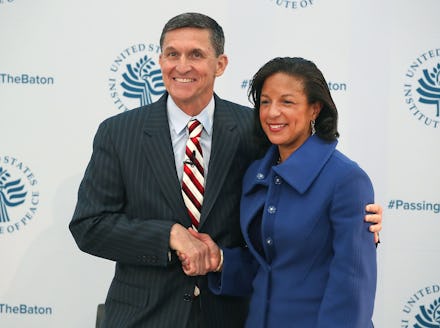What is "unmasking"? How Susan Rice ended up at the center of Trump team's Obama wire-tapping claims

Throughout 2017, President Donald Trump has made the extraordinary claim that his team was surveilled during the period immediately before the 2016 election.
He made these claims without providing any evidence.
Now, Bloomberg reports that Trump associates were swept up in raw intelligence data, not intentionally surveilled, and that Obama national security adviser Susan Rice requested the “unmasking” of those associates.
It is believed that this is the information House Intelligence Chairman Devin Nunes took to the White House (from the White House) to present to Trump.
Is “unmasking” legal?
The National Security Agency is legally permitted to obtain the names of individuals communicating with foreign entities. This authorization exists in a subchapter of Title 50 in the U.S. Code granted by the Foreign Intelligence Surveillance Act.
However, the names of U.S. citizens are routinely redacted from intelligence reports about the communication of these foreign officials to prevent civil liberties violations around privacy and surveillance.
Individuals with proper clearance, like Susan Rice, can request that the redacted names be shown.
This “unmasking” is a legal authority that experts find to be within the acceptable scope of the national security adviser and the other 20 or so officials with such clearances.
It is not remarkable that Rice would request any individual to be unmasked from a report.
Do Rice’s actions vindicate Trump’s claims?
In a word: no.
Nothing about the unmasking of individuals in these reports shows that Trump or his associates were being intentionally surveilled, even legally. All it demonstrates is that foreign entities were either discussing members of the Trump team or establishing communication with them.
The type of foreign-targeted surveillance that sweeps up such intelligence is not at all controversial and finds support from both sides of the aisle.
The only noteworthy part of this tempest-in-a-teacup is that a president of the United States would somehow not know about basic, legally-sanctioned national security mechanisms.
Why does Susan Rice’s name keep coming up?
The Obama official first earned the ire of Republicans when she was accused of misleading the public about the attack on an American embassy in Benghazi, Libya, on September 11, 2012.
Per ABC News,
“Rice became a target for conservatives when she went on Sunday morning current affairs shows such as ABC News' 'This Week' following the Benghazi attack and failed to characterize it as a pre-meditated act of terror. Instead, she said it was a spontaneous response to an anti-Islam film produced in the United States and cited in the region as an example of anti-Islamicism in the West.”
Many Republicans believe that Rice was lying, not misinformed. And when her name was floated to replace then-Secretary of State Hillary Clinton, the GOP stepped in to block that from becoming a possibility.
Sen. Lindsay Graham was an especially forceful voice, claiming Rice was either a liar or incompetent,
“This is about the role she played around four dead Americans when it seems to be that the story coming out of the administration — and she's the point person — is so disconnected to reality, I don't trust her. And the reason I don't trust her is because I think she knew better. And if she didn't know better, she shouldn't be the voice of America."
John Kerry went on to replace Hillary Clinton as secretary of state.
What happens now?
Since Susan Rice did nothing remarkable and appears to have followed the law, it’s unlikely this controversy will serve as anything more than a talking point for the Trump administration to try to bolster its still-evidence-free claim that the Trump team was the subject of intentional surveillance in 2016.
But with Trump’s approval ratings in a seeming free-fall since his election and most Republicans refusing to defend his version of the surveillance narrative, the White House will probably be forced to move on to the controversies of tomorrow.
Rice’s future is less clear, as her name has become a radioactive distraction for Democrats who want to move on from the Benghazi controversy and look toward rebuilding the party after the stunning defeat of the last election cycle.